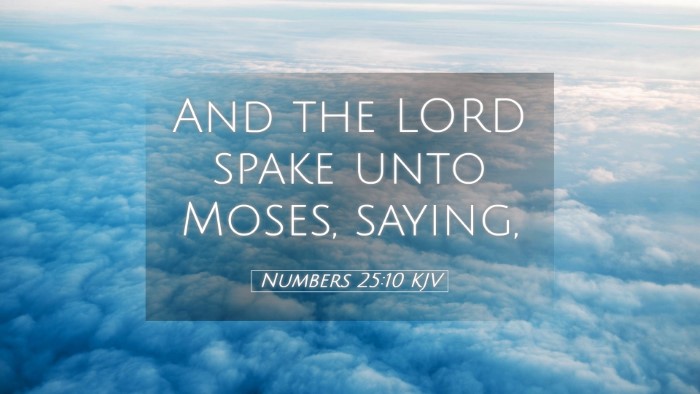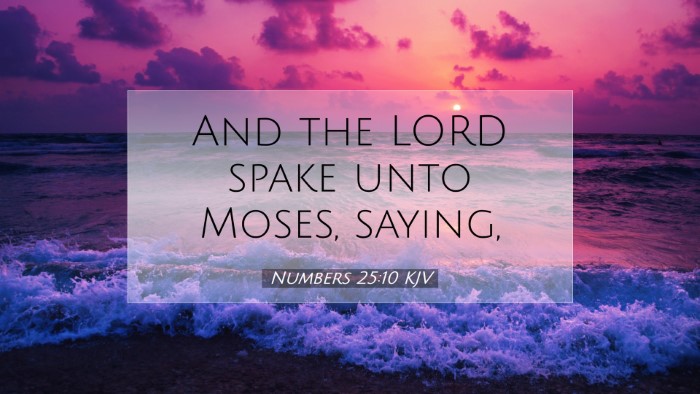Commentary on Numbers 25:10
Verse Context: Numbers 25:10 states, "And the LORD spake unto Moses, saying," which presents a pivotal moment in the narrative concerning God's response to Israel's unfolding situation.
Introduction
This passage serves as a crucial point in the Book of Numbers, reflecting God's concern over the fidelity of His people to the covenant. The events leading up to this verse reveal a serious breach in faithfulness, primarily through the actions and intermingling with the Moabites, which ultimately led to sin and judgment.
Interpretive Commentary
1. Historical Context
The Israelites, having been delivered from Egypt and experiencing God's miraculous provision in the wilderness, are now faced with the temptations of foreign influence. The sin of the people, involving idolatry and immorality with the Moabite women, provokes God's anger.
- Matthew Henry: Henry highlights the depravity of the peoples' actions, where the alluring practices of Moabite worship enticed Israel away from their covenantial relationship with Yahweh.
- Albert Barnes: Barnes points out that this act was not merely incidental; it was a deliberate transgression against God's command to remain separate from idolatrous nations.
- Adam Clarke: Clarke emphasizes that such behaviors draw immediate divine retribution and calls for holiness among God’s people.
2. Divine Response
In Numbers 25:10, the Lord addresses Moses, indicating that a divine response is warranted due to the people’s sins.
- Matthew Henry: He notes that God’s communication reaffirms His involvement in guiding and correcting His people, suggesting that leaders must remain vigilant against moral decay among the community.
- Albert Barnes: Barnes interprets this as a call to action for Moses, illustrating that God seeks leaders who will respond to transgressions decisively and lead the people back to righteousness.
- Adam Clarke: Clarke sees this divine communication as both a warning and an invitation to repentance, highlighting God’s continued desire for reconciliation.
3. Theological Implications
This verse underscores profound theological themes regarding holiness, covenant fidelity, and divine judgment.
- Covenantal Faithfulness: The Israelites were chosen to be a holy nation, and this episode illustrates the severe consequences of transgressing that identity.
- God’s Righteous Judgment: Divine displeasure is not whimsical; it is based upon justice. The actions of Israel led to a necessary response, which pastors must communicate to their congregations.
- Call to Moral Purity: The narrative calls modern believers to examine their own practices and whether they align with God's holiness.
4. Implications for Leadership
The role of leadership within the context of God’s expectations becomes evident in God's instruction to Moses in this verse. Strong leaders are essential in guiding communities toward holiness.
- Matthew Henry: He asserts that spiritual leaders are responsible for addressing sin within their congregations and advocating for righteousness.
- Albert Barnes: Barnes emphasizes proactive leadership, urging leaders to be vigilant in preventing sin's spread among the people.
- Adam Clarke: Clarke discusses the importance of leaders in invoking the voice of God to their communities, encouraging repentance and faithfulness.
5. Relevance for Today's Church
The lessons from Numbers 25:10 extend into contemporary Christian practice, where maintaining holiness and separation from the secular world is often challenged.
- Cultural Influence: The modern church must navigate cultural temptations and potential moral compromises that resemble Israel’s engagement with Moab.
- Call to Accountability: This passage challenges today’s believers to rise up against complacency and to hold one another accountable in their faith journeys.
- Spiritual Vigilance: It is a reminder that forgiveness is readily available, but requires acknowledgment of wrongdoing and a sincere return to God's pathways.
Conclusion
Numbers 25:10 serves as a vital point of reflection for pastors, students, theologians, and scholars. The insights gleaned from this verse, coupled with the teachings of public domain commentators, emphasize the gravity of covenant faithfulness and moral integrity. As we draw from the accounts of Moses and the response of God, may our hearts be stirred toward sincere devotion and commitment to God’s ways.


